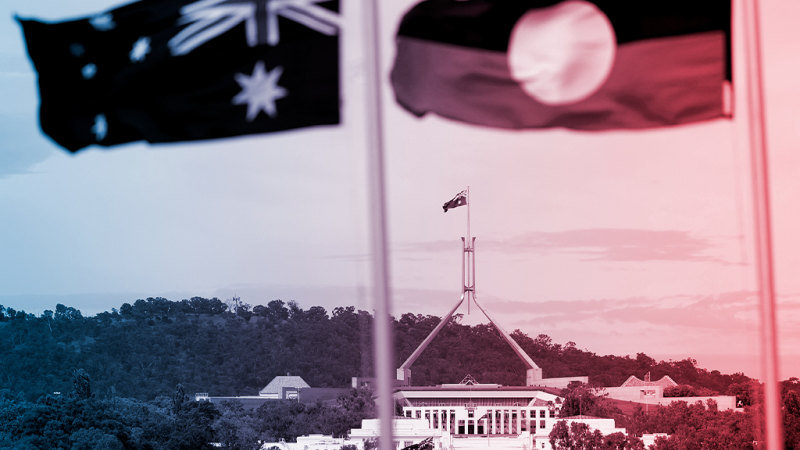Save articles for later
Add articles to your saved list and come back to them any time.
There has always been a paradox in the campaign for the Indigenous Voice – and it is starting to take a political toll on Anthony Albanese and his government.
The paradox is simple: in one breath, the prime minister tells Australians the Voice is hugely important to the country; in the next, he tells them it will make no difference to their lives.
Labor has lost support at a time of huge division over its pledge to find a new way to end Indigenous disadvantage.Credit: Alex Ellinghausen
“We are going to give the Australian people the opportunity to vote on something that overwhelmingly will not have a direct impact on most Australians,” he said in a radio interview in May. “But it just might make a positive difference for some of the most disadvantaged Australians.”
He is right, of course. The Voice is a defining national vote on whether Australians will support a new way to help those who suffer the worst poverty, health and incarceration rates in the country.
But it is not hard to hear the response from voters: if the Voice will not help me, why is it taking up so much of your time?
The latest Resolve Political Monitor confirms the real priority for voters: 91 per cent say it’s the cost of living. Asked about a range of issues, only 41 per cent name Indigenous policy – the lowest rating out of 18 topics from defence to health.
It is too late to change the decisions by the Yes campaign to postpone key details until after the referendum and rely on Albanese to be the chief advocate for a Yes vote. The government could have appointed a minister to lead the Yes case every day – someone to complement Indigenous Australians Minister Linda Burney – but chose not to, so Albanese must be the salesman-in-chief.
The Resolve survey reveals the political cost. Albanese has suffered a severe fall in his net approval rating, from a bumper 27 percentage points in April and May to just two points in August, and the government has lost ground on whether it is focused on the right issues.
This is not because voters like the look of Peter Dutton instead. The opposition leader’s net approval rating is minus 13 points. But he has less to lose from brawling over the Voice, so the angry argument in parliament has done more damage to Albanese.
Could some other factor explain this fall for Labor and its leader? The government has lost ground on other policies, such as jobs and wages, although it remains ahead of the Coalition on most issues. The Voice dominates debate, however, and some respondents named it a factor in their thinking.
“Why is he so focused on the Voice?” one respondent wrote about Albanese in the latest survey. Another said: “I used to think he was very good, but now just OK. The Voice is hurting him.”
Some see this as a positive, not a negative. “He’s passionate about the Voice and sticking to his principles, and his word,” wrote one.
The Voice is a big and contested issue, so it changes votes.
The return of former prime minister Kevin Rudd to Canberra last week, albeit briefly, offers an echo from history on Labor’s dilemma. Under pressure on climate policy in 2010, Rudd and his colleagues shelved their plans at the cost of their credibility. Albanese shows no signs of following that example.
Albanese began the year with political capital flowing out of the Labor vault like a river of gold coins. He has put this to use in the Voice campaign with FM radio interviews to assure everyone the reform is no threat. The wider Yes campaign, however, remains underpowered. It will take an enormous, unrelenting effort in the final weeks to win the referendum.
None of this means voters are dumping Labor. The latest Resolve numbers suggest Albanese would have won an election last Saturday with an increased majority, with no nationwide gain for the Greens and a big reversal for the Coalition. This also suggests that Dutton can win the politics on the Voice without winning power.
What it means, instead, is that there is a moral dimension to politics. Labor has lost support at a time of huge division over its pledge to find a new way to end Indigenous disadvantage. It could change course when confronted with this political cost, but Albanese chooses instead to fight for the Voice in the belief that the referendum must be won.
Those who want more conviction in politics do not have to look far to see it this year.
Cut through the noise of federal politics with news, views and expert analysis. Subscribers can sign up to our weekly Inside Politics newsletter here.
Most Viewed in Politics
From our partners
Source: Read Full Article

